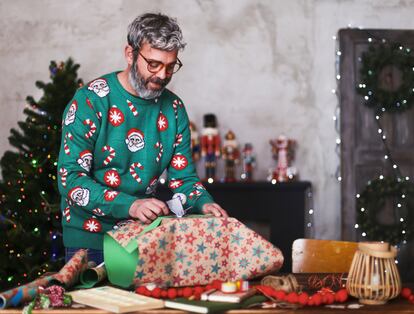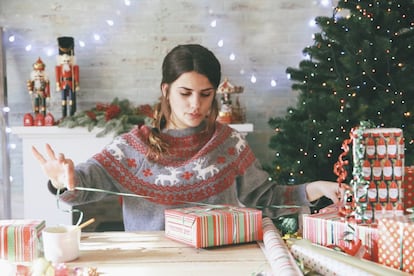Why are some people so bad at giving presents?
With Christmas upon us, we spoke to experts about the keys to choosing the right gift

With Christmas fast approaching, the search is on to find the right present. While good gifts show that you have paid close attention to the recipient’s needs and interests, a bad one can have them asking themselves if you even know them at all. But the worst presents of all are veiled criticisms.
Rocío, 39, for example, remembers when her mother-in-law gave her a sports jacket. “She knew perfectly well that I don’t like sports, and that I was not going to sign up to a class,” she recalls, laughing.
Adriana, 40, had a similar experience when she was 25, and her mother gave her a pressure cooker. “I was living by myself [at the time], I traveled as much as I could, I always ate out, and I worked until late: of course I wasn’t going to be cooking lentils,” she says. “That gift made me feel bad because either she was criticizing my lifestyle or she had no idea who I was as a person. I don’t know which was worse.”

“To give a good gift, you need to be aware of and show a real interest in the desires and tastes of the other person,” explains clinical psychologist Rocío Monroy. While this seems obvious, studies from the John Chambers College of Business and Economics at the University of Western Virginia found that gift-givers often put themselves first.
According to Monroy, some people choose gifts that speak highly of them, without taking the other person into account. A narcissist, for instance, “will look for an exclusive gift that is different to the others in the hope of being admired and praised by the recipient,” she says. “To feel better about themselves or superior, they will look for big, ostentatious presents.”
A lot of emotion is involved with gift-giving. “The act of giving a present comes with the feeling of feeling loved, recognized, respected and appreciated,” explains Monroy. And that’s why looking for a present can be so stressful. While in some cases, a wish list can help ease the stress, it can also exacerbate it, leading to anxiety of time and costs, or even competitiveness to find “the best present,” says Munroy.
What we gift also reflects our relationship with the other person, and this can add to the stress. “When a person receives a present that they think is too small or that they don’t like, it could lead to some internal conflict and even affect relationships,” warns the clinical psychologist.
But finding the right gift has the opposite effect, leading to “positive feelings and well-being,” she adds. When it comes to couples, Munroy recommends gifting an experience, as this can “foster and strengthen emotional connections.” But she is quick to point out that the other person should not feel in debt. In other words, the present “should come from the heart without emotional manipulation.”
And what is the protocol on regifting? According to Munroy, while this used to be frowned upon, attitudes are changing as society becomes more environmentally conscious. This is also true when it comes to returning presents. Instead of collecting dust in your wardrobe, you should politely ask if it can be exchanged, says protocol expert Marina Fernández. “It’s a good idea to give a brief explanation, such as: ‘I like it, but it’s too small for me,’ or ‘It’s beautiful, but I already have it.’ The key is not to offend the person who has gone to the effort of giving us a present.”
A final point to keep in mind is gift-wrapping. According to Jane Means, a gift-wrapping expert from the UK, this can make all the difference. “In my career, I have realized that small details really matter, and first impressions count,” she explains. “People really take note when you make an effort.” Means says not a lot is needed to do this: incorporating the person’s favorite color, or including something they like, for example, if the person was a gardener, you could include a freshly picked flower.
Fernández surmises: “The key to getting the right present is to try to put ourselves in the shoes of the person who is going to receive the gift, to think about not only their tastes but also the circumstances in which they are going to receive the present.”
Sign up for our weekly newsletter to get more English-language news coverage from EL PAÍS USA Edition
Tu suscripción se está usando en otro dispositivo
¿Quieres añadir otro usuario a tu suscripción?
Si continúas leyendo en este dispositivo, no se podrá leer en el otro.
FlechaTu suscripción se está usando en otro dispositivo y solo puedes acceder a EL PAÍS desde un dispositivo a la vez.
Si quieres compartir tu cuenta, cambia tu suscripción a la modalidad Premium, así podrás añadir otro usuario. Cada uno accederá con su propia cuenta de email, lo que os permitirá personalizar vuestra experiencia en EL PAÍS.
¿Tienes una suscripción de empresa? Accede aquí para contratar más cuentas.
En el caso de no saber quién está usando tu cuenta, te recomendamos cambiar tu contraseña aquí.
Si decides continuar compartiendo tu cuenta, este mensaje se mostrará en tu dispositivo y en el de la otra persona que está usando tu cuenta de forma indefinida, afectando a tu experiencia de lectura. Puedes consultar aquí los términos y condiciones de la suscripción digital.








































